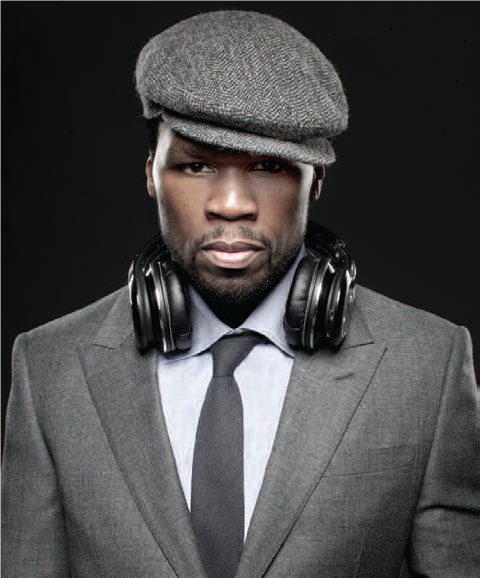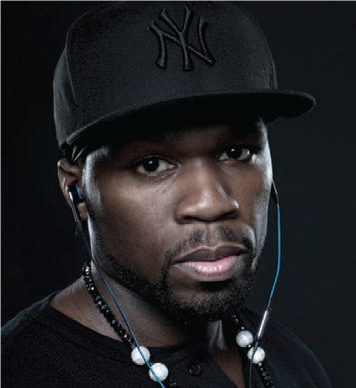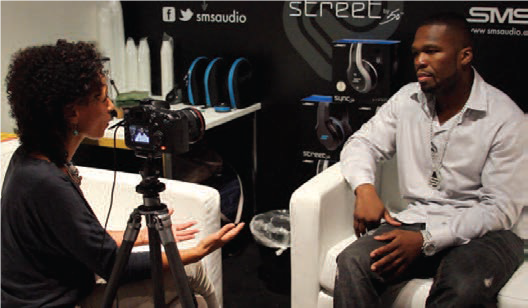Fate is a cruel mistress, especially in the entertainment industry. Reaching the top, even for a moment, is a longshot at best. Staying on top is a near impossibility. In the world of rap music, this is especially true. Which is what makes Curtis Jackson, better known as 50 Cent, someone worth talking to. He has used his top-selling albums as a springboard to do well in a number of other businesses—consumer electronics, energy drinks, boxing promotion and movie-making, to name four—and more importantly, to do a lot of good. EDGE’s Tetiana Anderson connected with 50 Cent at a technology trade show in Berlin, where he was promoting SMS Audio’s newest headphones. In a wide-ranging Q&A, she discovered a three-dimensional thinker with the drive and vision to redefine what a celebrity can (and should) be.
 EDGE: Why is diversifying into multiple forms of entertainment so important for you?
EDGE: Why is diversifying into multiple forms of entertainment so important for you?
50 CENT: The artist community can create a negative energy for you. My first record, Get Rich or Die Tryin’ was the largest debuting hip-hop album. I went on to sell 13 million records. Later in my career, people compared me to that first impression I made, and you don’t get a second chance at a first impression. In order to allow me to explore my passion for music, I moved away from it, gave myself other projects to be involved in. This is why there is such diversification of the portfolio of the things that generate an income. It secures the freedom to do things creatively as I please.
EDGE: You had two movies out in 2012—Freelancers and All Things Fall Apart. In All Things Fall Apart you dropped 60 pounds to play a college football star dying of cancer. How did you prepare for such a huge personal commitment?
50 CENT: I had all the emotions necessary for it ’cause I lost my best friend growing up under those circumstances. That was why I committed to a project that would take so much physical discipline. The scene where I’m on the bed with Lynn Whitefield and I actually start crying, my friend said the same words to me. He said, “Why is this happening to me? I haven’t done anything wrong.” Interestingly, everything that he was saying he didn’t do was something I did—a mistake I made in my past.
EDGE: How so?
50 CENT: When my mother got killed, I moved to my grandmother’s house as the new ninth child. We lived on my grandfather’s income, so there was not a lot of finances around. You kind of got things when someone was done with them. I was given a special want for nice things from my experience with my mom—everyone that I’d seen that had something nice was from her life. They had nice cars, jewelry, beautiful women around. It’s pretty tough to suppress that want for instant gratification when you see people that have things…and when you don’t have someone to say, “You go that route, you’re gonna have a bad outcome.”
EDGE: So to get those things you turned to selling drugs?
50 CENT: My mom’s involvement in it kind of gave me birthrights. There are no requirements, there’s no specific level of education you have to have.
EDGE: Getting back to the movie, you actually financed the project.
50 CENT: I look at money like it’s freedom. It gives me the ability to better myself and to go after my ideas, like SMS Audio. You’ll see a lot of other talent sign licensing agreements with companies and receive an advance on the royalties of sales of products with their likeness. I invested in it. I own this company, so it’s a huge difference between what you’ll see from those other artists and what you’ll see from me.
EDGE: SMS Audio donates a portion of sales proceeds to Feeding America and SK Shot—your energy drink company—does the same thing to help feed hungry children in Africa, while creating entrepreneurial opportunities for people there. Do you feel others in the rap industry are doing a good job of giving back?
50 CENT: You know, the traditional way of giving back, we gotta modify it. Most rappers that have some success have organizations that they put together in their names, but those things are being done for tax purposes. When you reach a certain level of success, you start to be  interested in what your legacy is. The people who resonate the strongest are those people who consistently helped others. In terms of what SK Shot does, traveling the last time in Africa it was unbelievable. The numbers are astronomical. You wouldn’t even believe that that many people die from not having something to eat—and meanwhile we choose what we’re gonna eat, and throw away what we’re not.
interested in what your legacy is. The people who resonate the strongest are those people who consistently helped others. In terms of what SK Shot does, traveling the last time in Africa it was unbelievable. The numbers are astronomical. You wouldn’t even believe that that many people die from not having something to eat—and meanwhile we choose what we’re gonna eat, and throw away what we’re not.
EDGE: How does that affect you?
50 CENT: When you get to a certain point you become more interested in philanthropy. You start to look at who you are. You start asking yourself what’s really important to you. It’s not an actual dollar amount. It’s about your happiness.
EDGE: How have you incorporated that philosophy into your businesses?
50 CENT: You create a model. When you see people in the park on Occupy Wall Street or Occupy LA and Chicago and all, it’s clear that they feel the major corporations don’t care about people, period. But if they adopt models like SMS Audio or like the SK model— where every product that is sold provides for someone in need—it says they’re conscious. To promote conscious capitalism is the way we actually find the finances for social change. There’s no other place that I see enough money.
EDGE: Is that something that is missing in the hip-hop industry?
50 CENT: Well, because a lot of talent comes from not having very much, it’s about living life on the highest level possible. Overall, within hip-hop, we haven’t had people get to where they’ve actually stopped being conscious of having more than someone else and say, Am I actually comfortable? Am I happy? What do I want? If you ask a person what defines their life, and they offer the answer I’m gonna make a billion dollars, I’m gonna be a billionaire, that would be pretty vain, wouldn’t it? But if you ask someone who is completely content with their financial space and conscious of their surroundings What defines your life? they’re probably going to say their loved ones. We get tunnel vision. We’re ambitious. We move from one goal to the next goal to accomplish the next thing and the next thing. I could easily be mistaken for a workaholic, but I exercise that “Whistle While You Work” concept. I’m enjoying myself. This is what I am supposed to be doing.
 EDGE: Yet, there are tremendous stresses that come with succeeding in your industry—including pressures to stay on top, to make money to remain relevant.
EDGE: Yet, there are tremendous stresses that come with succeeding in your industry—including pressures to stay on top, to make money to remain relevant.
50 CENT: There’s a level of confidence required to be yourself enough to create a separation. You’ve got to understand the history of music and entertainment. You build entertainers to destroy entertainers, for the sake of entertainment. The way around the destruction process is having something to fall back on. That allows me to do what I actually feel like is the hottest material right now. Otherwise, I would pull my hair out trying to second-guess what someone else is going to think or feel.
EDGE: You branched out into boxing promotion this summer with TMT (The Money Team). Where would you like to take professional boxing, which now gets stiff competition from mixed martial arts?
50 CENT: Doing the research, 56 percent of UFC’s (Ultimate Fighting Challenge) demo is 18 to 34. With boxing it’s 30 and up. I think professional boxing lacks what the UFC has. So, to bring youth culture, maybe you need to bring the theatrics you see at a WWE event into professional boxing. You have to pay attention to the successful models that people have utilized elsewhere in order to make minor changes to the natural sport of boxing.
EDGE: Can Atlantic City reclaim its status as a Mecca for professional boxing?
50 CENT: Absolutely! Between Atlantic City and New York City, I’d be looking forward to put on shows in those areas.
EDGE: If you had a choice between your next record going platinum or developing one of your fighters into a heavyweight champ, which would you choose?
50 CENT: My record. I have a stronger passion for music than anything. I love having the ability to be a part of the other businesses, but I remember they came by way of music. If I didn’t have the finances or the popularity from my music, I wouldn’t be able to be a part of those projects.
All photos courtesy of SMS Audio.
Editor’s Note: If Tetiana Anderson’s name sounds familiar, you may have read her interview with Roberta Flack earlier this year in EDGE—or seen her face and heard her voice on television. She’s chased storms for the Weather Channel, covered Operation Iraqi Freedom for MSNBC from Baghdad and is currently a freelance reporter/producer for organizations including NY-1 and CNN. A journalism fellowship recently took her to Berlin, where she crossed paths with 50 Cent at an SMS Audio media event.




